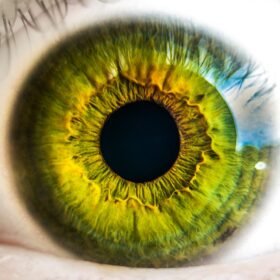Dupixent side effects are generally mild in severity. Because Dupixent is a very targeted drug, it has little impact on other organ systems.
What is Dupixent?
Dupixent is the brand name of Dupilumab. Dupixent is a monoclonal antibody that targets human IL-4Rα (Interleukin 4 receptor alpha).
By binding to IL-4Rα, it inhibits the signaling pathway of IL-4 and IL-13. Both these signaling pathways are involved in the activation of eosinophils, basophils, mast cells, and other allergic cells.
It is given to patients via subcutaneous injections. It is mainly used to treat these diseases which are usually not treated effectively in other ways. Indications of Dupixent include [Ref]:

Eczema (Atopic Dermatitis):
It is a type of dermatitis in which skin becomes allergic when an antigen outside the body comes in contact.
Patients with atopic dermatitis usually develop body rashes that are intensely itchy. This causes severe psychological distress, in addition to the physical symptoms.
Patients usually get relief from topical emollients, antihistamines, and corticosteroids. However, in severe cases, when all these treatments fail, Dupixent comes to the rescue.
Dupixent is a very potent and safe drug and helps most patients, even those who are resistant to other first-line and second-line drugs.
Rhinosinusitis
It is a disease in which there is swelling of the membrane of the nose which is mucous in nature.
Rhinosinusitis with nasal polyposis usually occurs in patients who have had allergic rhinitis for quite some time.
Apart from nasal discharge, nasal blockage, headaches, and frequent sinus infections, patients may also develop snoring and difficulty in breathing.
Dupixent has been associated with the improvement of most of these symptoms. It may cause the regression of nasal polyps that improves the symptoms of snoring and difficulty in breathing.

Asthma
It is the blockage of the airway and chest accompanied by cough and wheezing in response to allergens.
Asthma is a reversible airway inflammation caused by allergens such as dust, pollens, house mites, foods, and even emotions.
Asthma can be mild with little or no symptoms. However, severe asthma can be life-threatening.
People with asthma are usually treated with inhaled bronchodilators and corticosteroids. However, severe asthma may not respond to these therapies. Non-responders usually receive oral corticosteroids.
Because oral corticosteroids have a lot of side effects, biological medicines are being increasingly used to treat asthma.
Dupixent is one of the most potent biological medicine that is used to treat patients with severe asthma who do not respond to first and second-line treatments.
Side effects of Dupixent:
Because Dupixent is a very targeted form of biological treatment, it is usually very well tolerated.
Side effects of Dupixent are generally mild in nature. In some cases, especially those who develop severe eye-related side effects, people may need to discontinue the treatment.

Eye-related side effects of Dupixent:
Dupixent has dramatic healing effects as far as lung and skin diseases are concerned. But it causes paradoxical inflammation of the eyes.
It affects the eyes in different ways ranging from mild nonspecific redness to severe vision-threatening inflammation of the eyes.
Conjunctivitis:
It is the inflammation of the conjunctiva. Patients with conjunctivitis have itching, redness, and watery or mucoid discharge from the eyes as a result of inflammation of the conjunctiva.
Ulcers in the cornea (Keratitis):
Ulcers may occur in the cornea with the use of Dupixent. These ulcers may be mild and cause light pain, redness, and itching or may be severe and cause visual loss.
Dry Eyes and Blepharitis:
Dry eyes are common symptoms. However persistent dry eyes may occur in patients using Dupixent.
Dry eyes may cause photosensitivity, blurred vision, and pain. It may be associated with infections as well.
Blepharitis is inflammation of the eyelids. Blepharitis manifesting as red eyelids that are itchy and sometimes painful with crusted lesions can occur as a result of Dupixent use.
Patients have also been reported to develop ocular herpes.
Insomnia:
It may cause insomnia which is a disorder in which you can’t sleep easily and you may have problems with your sleeping routine.
Insomnia may occur as a result of excitement, pain, or because of a direct effect of Dupixent on the brain.
Patients may be advised to improve sleep hygiene, go to bed on time, make their bed more comfortable, and try reading a novel or a book before going to sleep.

Tooth pain:
It may cause severe pain in your teeth. This is a very weird side effect, however, since myalgias and arthralgia have been reported with Dupixent, a toothache is not a strange side effect.
Gastritis:
It may cause swelling of the lining of your stomach and can disturb your stomach causing irregular and abnormal bowel movements.
People may get relief by taking an antacid or a PPI like omeprazole and dexlansoprazole.
Joint pain:
It can cause severe pain in joints, especially in movements such as in the knee, elbow, and hip joints.
Arthralgias and frank symptoms of arthritis have been documented with the use of Dupixent. Arthritis can be explained by the change in the ratio of T-helper cells and cytotoxic T cells.
People may get relief by using OTC pain medications such as Tylenol, Adderall, Naproxen, or celecoxib.
Rashes:
It may cause rashes which are severe redness and itching on the skin. It may become a wound because of the constant rubbing of the itching site by the one taking it.
The rash may get better with OTC anti-allergics such as Benadryl or Cetirizine.
Vasculitis:
It may cause an inflammation of the blood vessels. Vasculitis can affect any organ system including the:
- brain (where it can cause headaches, strokes, and bleeding),
- heart (which may cause angina and myocardial infarction),
- gut (which may cause abdominal pain and bleeding), and
- skin (which can cause a rash, vasculitis ulcers, and Raynaud’s phenomena).
Vasculitis usually is not considered a side effect of Dupixent, rather it is caused by the unmasking of vasculitis symptoms when corticosteroids are being tapered off.
Eosinophilia:
Eosinophilia has been reported in patients using Dupixent. The clinical importance of eosinophilia caused by Dupixent is not known.
Cold Sores:
It may cause the formation of small painful blisters in patients who already have the herpes virus.
These blisters are very painful and itchy and the one suffering from them faces severe burning sensations at the corner of the mouth, at the lips, etc. These blisters can burst and spread more on the face.
Fever:
Dupixent can cause drug fever. Drug fever is a tricky situation where patients are usually investigated and treated for a viral or bacterial infection.
Drug fever gets better after stopping Dupixent.
Immunity:
It may decrease your natural defense mechanism and thus can make you vulnerable to many parasitic infections which would have not happened otherwise.
All patients need to get tested for parasitic infections and get treated before initiating Dupixent treatment.
If a patient has already been on Dupixent treatment and gets parasitic infections, it can be treated with antiparasitic medications.
In severe and resistant cases, Dupixent treatment may need to be discontinued.
Sore throat:
It may cause swelling in your throat accompanied by severe stinging pain sensations and more pain while eating and speaking.
In Summary:
Dupixent is potent and novel medicine for the treatment of Allergic asthma, Atopic dermatitis, and chronic rhinosinusitis.
It is generally very well tolerated, however, certain side effects may compel the patient to discontinue the treatment.
Common side effects, apart from injection site reactions are eye-related side effects including conjunctivitis, dry eyes, and keratitis.